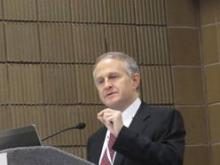User login
NEW ORLEANS – Full-intensity conditioning regimens before stem-cell transplants put patients at risk for cognitive problems afterward, investigators reported.
Compared with healthy controls, men and women who underwent allogeneic hematopoietic stem transplants (HCT) with full-intensity pre-transplant conditioning continued to have deficits in executive function for at least 2 years after transplant.
In contrast, patients who had reduced-intensity conditioning before their transplants had initial cognitive deficits but recovered gradually, continued to have significantly better cognitive function than patients who had undergone full-intensity conditioning (P = .01), and had no significant deficits in executive function compared with controls at 2-year follow-up, reported Dr. Smita Bhatia, professor and chair of the department of population sciences at City of Hope in Duarte, Calif.
The investigators also found preliminary evidence to suggest that the length of telomeres, the caps at the end of chromosomes that protect chromosomal integrity through cellular division, also may be associated with risk for post-transplant cognitive problems -- at least in women.
In women, telomeric shortening before HCT was associated with poorer cognitive functioning after HCT in domains of executive function, processing speed, verbal speed, and working memory, Dr. Bhatia reported at the American Society of Hematology annual meeting.
Those especially at risk for post-transplant cognitive problems include older patients, men, Hispanics, people with lower socioeconomic status, those with high levels of fatigue, and those who undergo a full-intensity pre-transplant conditioning regimen.
"This study has identified vulnerable sub-populations, and there is a need to develop future interventions targeted toward these patients, as well as to understand the pathogenesis of this outcome," Dr. Bhatia said in a briefing before the presentation of results.
Dr. Bhatia stressed that clinicians need to educate patients and families about the cognitive consequences of transplantation.
"When these patients come back, and especially younger patients when they are not performing well in their schools or college settings, very often the family blames these patients for being lazy, and that is something which we need to absolutely negate and say that this is the effect of the treatment they received, and we need to offer them services," she said.
The investigators conducted a 2-year prospective longitudinal study comparing patients scheduled for HCT with age and sex-matched healthy controls.
The participants underwent baseline testing with a 2-hour battery of standardized neurocognitive tests assessing 8 cognitive domains. Scores of healthy controls were used to correct the scores of HCT patients for practice effects.
Patients also had pre-transplant blood draws tested by assay for relative telomere length, defined as the ratio of telomeres to single genes.
As the authors had previously shown, allogeneic HCT recipients overall have poorer cognitive function than controls in domains of executive function, processing speed, verbal fluency, and fine motor dexterity.
For example, in an analysis adjusted for age, race, and income, controls had significantly better executive function scores than did transplant recipients (P = .0008).
When the researchers drilled down a little deeper, however, they found that patients who had undergone full-intensity conditioning did especially poorly in domains of executive function, processing speed, verbal speed, and visual memory.
When they looked at telomere length, they found in an analysis adjusted for age, race, income, IQ, diagnosis, risk of relapse, and remission status that women with short telomeres fared worse than women with long telomeres. At a 2-year follow-up women with short telomeres had significantly poorer executive function scores (P = .004).
There were no significant associations between telomere length and cognitive function among men, however.
Dr. Bhatia noted that chemotherapy and radiation both accelerate telomere shortening and that glial cells, which divide, therefore are susceptible to telomere shortening, offering a potential explanation for the association between telomere length and cognitive function.
Although the investigators have not yet sorted out which components of the conditioning regimen contribute to cognitive problems, it appears to be a combination of total body irradiation and high-myeloablative intensity agents, Dr. Bhatia said.
Clinical trials testing behavioral therapy and pharmacologic therapy with agents that support attention and cognitive processing, such as methylphenidate, are underway, she noted.
Dr. Jeffrey Miller, who moderated the briefing at which Dr. Bhatia presented the data, noted that reduced-intensity pre-transplant conditioning is suitable for older, frailer patients, and in this study was shown to offer cognitive protection compared with full-intensity conditioning.
Reduced-intensity conditioning, however, comes with a significant trade-off in terms of increased risk for relapse, said Dr. Miller, deputy director of the Masonic Cancer Center and the Clinical and Translational Sciences Institute, University of Minnesota, Minneapolis.
Dr. Bhatia commented that the most important clinical consideration is which treatment strategy is likely to offer the best relapse-free survival.
"Then we have the luxury of looking at whether we have a mode of therapy that is less toxic down the road," she said.
The study was supported in part by the Leukemia & Lymphoma Society. Dr. Bhatia and Dr. Miller reported having no relevant conflicts of interest to disclose.
NEW ORLEANS – Full-intensity conditioning regimens before stem-cell transplants put patients at risk for cognitive problems afterward, investigators reported.
Compared with healthy controls, men and women who underwent allogeneic hematopoietic stem transplants (HCT) with full-intensity pre-transplant conditioning continued to have deficits in executive function for at least 2 years after transplant.
In contrast, patients who had reduced-intensity conditioning before their transplants had initial cognitive deficits but recovered gradually, continued to have significantly better cognitive function than patients who had undergone full-intensity conditioning (P = .01), and had no significant deficits in executive function compared with controls at 2-year follow-up, reported Dr. Smita Bhatia, professor and chair of the department of population sciences at City of Hope in Duarte, Calif.
The investigators also found preliminary evidence to suggest that the length of telomeres, the caps at the end of chromosomes that protect chromosomal integrity through cellular division, also may be associated with risk for post-transplant cognitive problems -- at least in women.
In women, telomeric shortening before HCT was associated with poorer cognitive functioning after HCT in domains of executive function, processing speed, verbal speed, and working memory, Dr. Bhatia reported at the American Society of Hematology annual meeting.
Those especially at risk for post-transplant cognitive problems include older patients, men, Hispanics, people with lower socioeconomic status, those with high levels of fatigue, and those who undergo a full-intensity pre-transplant conditioning regimen.
"This study has identified vulnerable sub-populations, and there is a need to develop future interventions targeted toward these patients, as well as to understand the pathogenesis of this outcome," Dr. Bhatia said in a briefing before the presentation of results.
Dr. Bhatia stressed that clinicians need to educate patients and families about the cognitive consequences of transplantation.
"When these patients come back, and especially younger patients when they are not performing well in their schools or college settings, very often the family blames these patients for being lazy, and that is something which we need to absolutely negate and say that this is the effect of the treatment they received, and we need to offer them services," she said.
The investigators conducted a 2-year prospective longitudinal study comparing patients scheduled for HCT with age and sex-matched healthy controls.
The participants underwent baseline testing with a 2-hour battery of standardized neurocognitive tests assessing 8 cognitive domains. Scores of healthy controls were used to correct the scores of HCT patients for practice effects.
Patients also had pre-transplant blood draws tested by assay for relative telomere length, defined as the ratio of telomeres to single genes.
As the authors had previously shown, allogeneic HCT recipients overall have poorer cognitive function than controls in domains of executive function, processing speed, verbal fluency, and fine motor dexterity.
For example, in an analysis adjusted for age, race, and income, controls had significantly better executive function scores than did transplant recipients (P = .0008).
When the researchers drilled down a little deeper, however, they found that patients who had undergone full-intensity conditioning did especially poorly in domains of executive function, processing speed, verbal speed, and visual memory.
When they looked at telomere length, they found in an analysis adjusted for age, race, income, IQ, diagnosis, risk of relapse, and remission status that women with short telomeres fared worse than women with long telomeres. At a 2-year follow-up women with short telomeres had significantly poorer executive function scores (P = .004).
There were no significant associations between telomere length and cognitive function among men, however.
Dr. Bhatia noted that chemotherapy and radiation both accelerate telomere shortening and that glial cells, which divide, therefore are susceptible to telomere shortening, offering a potential explanation for the association between telomere length and cognitive function.
Although the investigators have not yet sorted out which components of the conditioning regimen contribute to cognitive problems, it appears to be a combination of total body irradiation and high-myeloablative intensity agents, Dr. Bhatia said.
Clinical trials testing behavioral therapy and pharmacologic therapy with agents that support attention and cognitive processing, such as methylphenidate, are underway, she noted.
Dr. Jeffrey Miller, who moderated the briefing at which Dr. Bhatia presented the data, noted that reduced-intensity pre-transplant conditioning is suitable for older, frailer patients, and in this study was shown to offer cognitive protection compared with full-intensity conditioning.
Reduced-intensity conditioning, however, comes with a significant trade-off in terms of increased risk for relapse, said Dr. Miller, deputy director of the Masonic Cancer Center and the Clinical and Translational Sciences Institute, University of Minnesota, Minneapolis.
Dr. Bhatia commented that the most important clinical consideration is which treatment strategy is likely to offer the best relapse-free survival.
"Then we have the luxury of looking at whether we have a mode of therapy that is less toxic down the road," she said.
The study was supported in part by the Leukemia & Lymphoma Society. Dr. Bhatia and Dr. Miller reported having no relevant conflicts of interest to disclose.
NEW ORLEANS – Full-intensity conditioning regimens before stem-cell transplants put patients at risk for cognitive problems afterward, investigators reported.
Compared with healthy controls, men and women who underwent allogeneic hematopoietic stem transplants (HCT) with full-intensity pre-transplant conditioning continued to have deficits in executive function for at least 2 years after transplant.
In contrast, patients who had reduced-intensity conditioning before their transplants had initial cognitive deficits but recovered gradually, continued to have significantly better cognitive function than patients who had undergone full-intensity conditioning (P = .01), and had no significant deficits in executive function compared with controls at 2-year follow-up, reported Dr. Smita Bhatia, professor and chair of the department of population sciences at City of Hope in Duarte, Calif.
The investigators also found preliminary evidence to suggest that the length of telomeres, the caps at the end of chromosomes that protect chromosomal integrity through cellular division, also may be associated with risk for post-transplant cognitive problems -- at least in women.
In women, telomeric shortening before HCT was associated with poorer cognitive functioning after HCT in domains of executive function, processing speed, verbal speed, and working memory, Dr. Bhatia reported at the American Society of Hematology annual meeting.
Those especially at risk for post-transplant cognitive problems include older patients, men, Hispanics, people with lower socioeconomic status, those with high levels of fatigue, and those who undergo a full-intensity pre-transplant conditioning regimen.
"This study has identified vulnerable sub-populations, and there is a need to develop future interventions targeted toward these patients, as well as to understand the pathogenesis of this outcome," Dr. Bhatia said in a briefing before the presentation of results.
Dr. Bhatia stressed that clinicians need to educate patients and families about the cognitive consequences of transplantation.
"When these patients come back, and especially younger patients when they are not performing well in their schools or college settings, very often the family blames these patients for being lazy, and that is something which we need to absolutely negate and say that this is the effect of the treatment they received, and we need to offer them services," she said.
The investigators conducted a 2-year prospective longitudinal study comparing patients scheduled for HCT with age and sex-matched healthy controls.
The participants underwent baseline testing with a 2-hour battery of standardized neurocognitive tests assessing 8 cognitive domains. Scores of healthy controls were used to correct the scores of HCT patients for practice effects.
Patients also had pre-transplant blood draws tested by assay for relative telomere length, defined as the ratio of telomeres to single genes.
As the authors had previously shown, allogeneic HCT recipients overall have poorer cognitive function than controls in domains of executive function, processing speed, verbal fluency, and fine motor dexterity.
For example, in an analysis adjusted for age, race, and income, controls had significantly better executive function scores than did transplant recipients (P = .0008).
When the researchers drilled down a little deeper, however, they found that patients who had undergone full-intensity conditioning did especially poorly in domains of executive function, processing speed, verbal speed, and visual memory.
When they looked at telomere length, they found in an analysis adjusted for age, race, income, IQ, diagnosis, risk of relapse, and remission status that women with short telomeres fared worse than women with long telomeres. At a 2-year follow-up women with short telomeres had significantly poorer executive function scores (P = .004).
There were no significant associations between telomere length and cognitive function among men, however.
Dr. Bhatia noted that chemotherapy and radiation both accelerate telomere shortening and that glial cells, which divide, therefore are susceptible to telomere shortening, offering a potential explanation for the association between telomere length and cognitive function.
Although the investigators have not yet sorted out which components of the conditioning regimen contribute to cognitive problems, it appears to be a combination of total body irradiation and high-myeloablative intensity agents, Dr. Bhatia said.
Clinical trials testing behavioral therapy and pharmacologic therapy with agents that support attention and cognitive processing, such as methylphenidate, are underway, she noted.
Dr. Jeffrey Miller, who moderated the briefing at which Dr. Bhatia presented the data, noted that reduced-intensity pre-transplant conditioning is suitable for older, frailer patients, and in this study was shown to offer cognitive protection compared with full-intensity conditioning.
Reduced-intensity conditioning, however, comes with a significant trade-off in terms of increased risk for relapse, said Dr. Miller, deputy director of the Masonic Cancer Center and the Clinical and Translational Sciences Institute, University of Minnesota, Minneapolis.
Dr. Bhatia commented that the most important clinical consideration is which treatment strategy is likely to offer the best relapse-free survival.
"Then we have the luxury of looking at whether we have a mode of therapy that is less toxic down the road," she said.
The study was supported in part by the Leukemia & Lymphoma Society. Dr. Bhatia and Dr. Miller reported having no relevant conflicts of interest to disclose.
AT ASH 2013
Vitals: Patients who had reduced-intensity conditioning before transplant had significantly better cognitive function than patients who had undergone full-intensity conditioning (P = .01) and had no significant deficits in executive function compared with controls at 2-year follow-up.
Data source: Prospective, longitudinal follow-up study of 242 hematopoietic stem-cell transplant recipients and 98 healthy matched controls.
Disclosures: The study was supported in part by the Leukemia & Lymphoma Society. Dr. Bhatia and Dr. Miller reported having no relevant conflicts of interest to disclose.


